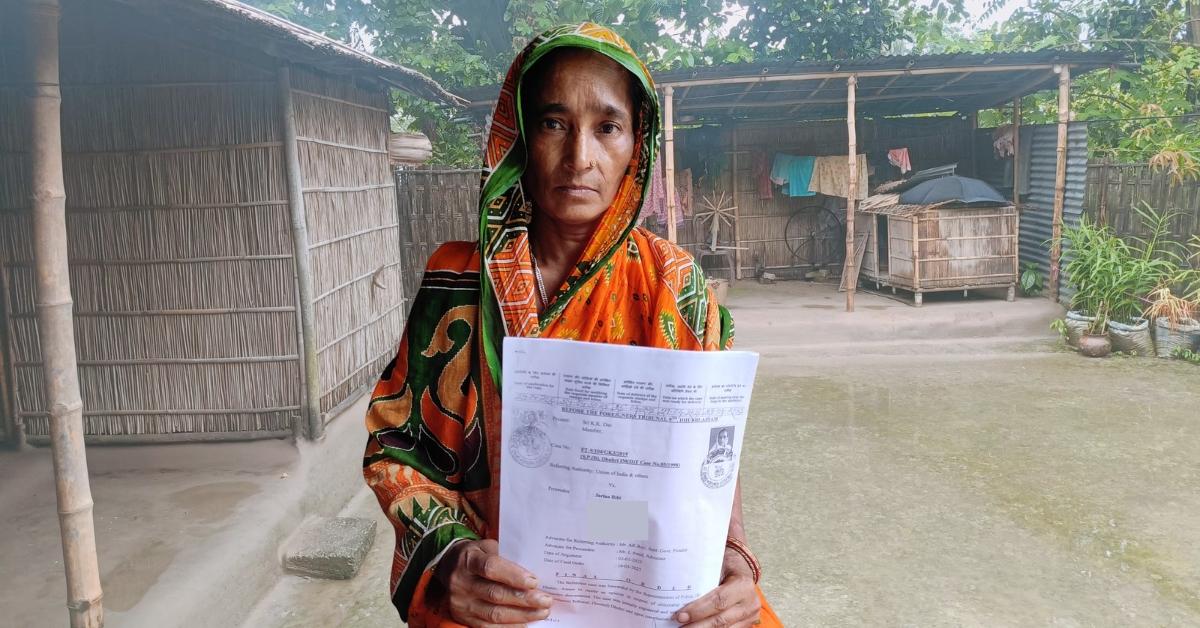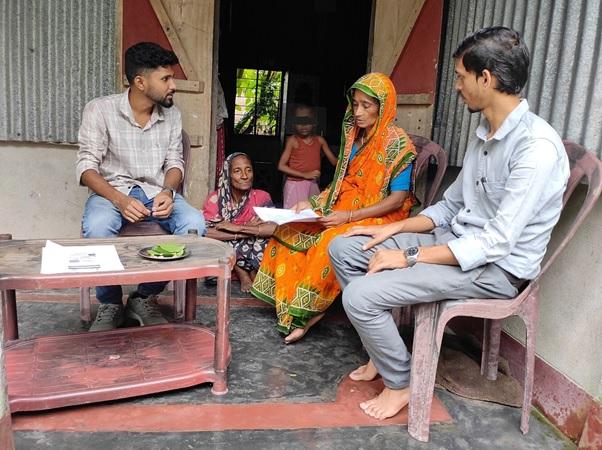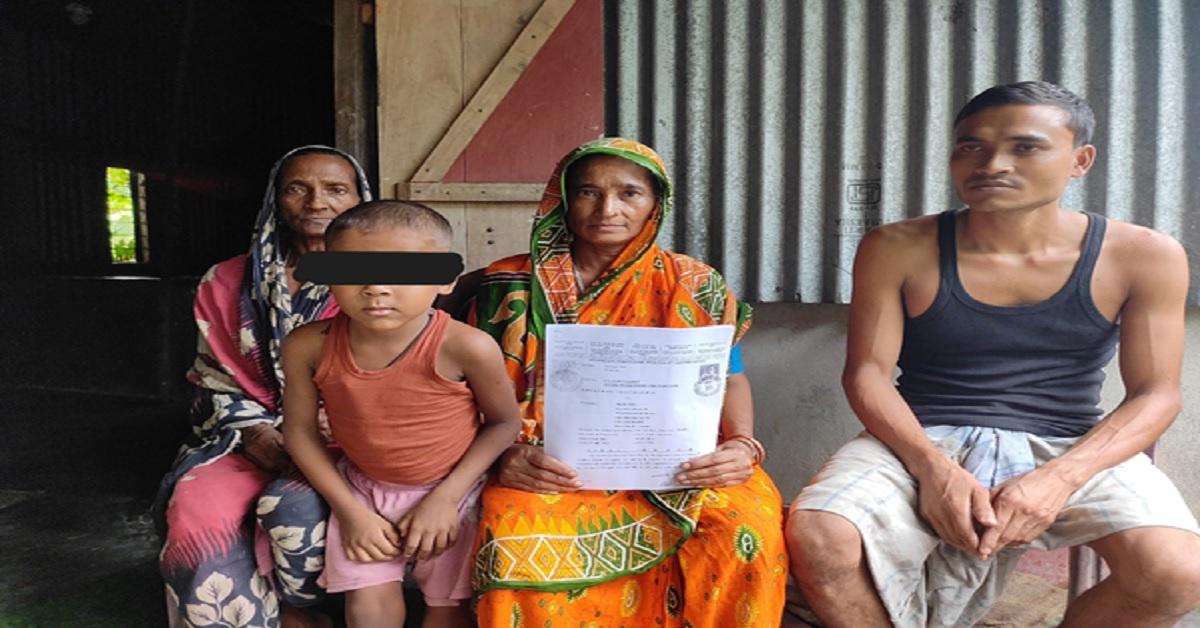
Victory in Dhubri FT: Jarina Bibi declared Indian after years of ordeal Marked a “D-voter”, branded a suspected foreigner, she wins back her rights with CJP’s support
11, Sep 2025 | CJP Team
On March 10, 2025, the Dhubri Foreigners Tribunal (FT) delivered justice to Jarina Bibi, a Muslim woman from Assam who had been wrongly branded a “suspected foreigner.” With timely legal and paralegal assistance from Citizens for Justice and Peace (CJP), she proved her Indian citizenship before the Tribunal and reclaimed dignity long denied.
From “D-Voter” to Tribunal notice
Born on July 20, 1979 in village Kherbari Pt-IV, Dhubri district, Assam, Jarina Bibi is the daughter of late Jabed Ali and Janmati Bibi. Her family’s roots in Assam stretch back generations: her grandparents Meheddi Munshi (also known as Mohor Uddin Munshi) and Jamiran Bibi were recorded in the 1966 electoral rolls; her father Jabed Ali appeared in the 1970 rolls; and her mother remains a regular voter even today.
Every week, CJP’s dedicated team in Assam, comprising community volunteers, district volunteer motivators, and lawyers, provides vital paralegal support, counseling, and legal aid to many affected by the citizenship crisis in over 24 districts in Assam. Through our hands-on approach, 12,00,000 people successfully submitted completed NRC forms (2017-2019). We fight Foreigner Tribunal cases monthly at the district level. Through these concerted efforts, we have achieved an impressive success rate of 20 cases annually, with individuals successfully obtaining their Indian citizenship. This ground level data ensures informed interventions by CJP in our Constitutional Courts. Your support fuels this crucial work. Stand with us for Equal Rights for All #HelpCJPHelpAssam. Donate NOW!
Yet, despite this, Jarina’s name was arbitrarily marked with the “D” (doubtful) voter tag. A Suspected Foreigner notice followed—turning her life upside down. For her husband, Mojammal Haque, a migrant worker, challenging the notice in court initially felt impossible due to lack of awareness and resources. Fear and despair gripped the family.

CJP Assam Team with Jarina Bibi outside her home
CJP steps in
The turning point came when CJP’s Dhubri District Volunteer Motivator Habibul Bepari and Assam State In-charge Nanda Ghosh stepped in. With the guidance of Advocate Ishkendar Azad, CJP assisted the family in gathering and authenticating documents, many of which were beyond their immediate reach due to poverty and illiteracy.
CJP secured:
- Electoral rolls from 1966, 1970, 1989, and 1997 proving the voting history of her grandparents, parents, and even Jarina herself.
- Land and revenue records confirming holdings of her father and grandfather.
- A Gaon Panchayat certificate (2015), later authenticated in court, linking Jarina to her father, Jabed Ali.
- Testimony of her mother, Janmati Bibi, who stood before the Tribunal and confirmed her daughter’s lineage.
These efforts were crucial in overcoming the structural hurdles of proving “linkage”—a recurring difficulty for women in Assam who often lack formal education, land in their names, or school records. As CJP’s work shows, legal aid often requires not just documents but also counselling, persuasion, and persistence to ensure families do not give up.
The Tribunal’s legal findings
The Final Order of March 10, 2025, delivered by FT Member Kirti Kamal Das, demonstrates how strong evidence, when properly marshalled, can withstand scrutiny:
- The Tribunal held that Jarina’s parental linkage with late Jabed Ali was “adequately established”, supported both by her mother’s oral testimony (DW-2) and documentary evidence.
- The Election Officer’s verification report (20 August 2024) confirmed the authenticity of electoral rolls dating back to 1966, validating the family’s continuous presence in Assam.
- Land documents and revenue receipts corroborated long-standing residence.
- The Tribunal emphasized that under Section 9 of the Foreigners Act, 1946, the burden of proof rests on the proceedee. Jarina successfully discharged this burden by producing reliable and trustworthy records.
The Tribunal thus concluded:
“From the above context, it appears that the pleadings of Proceedee and her exhibited documents are being substantiated each other which demonstrate that Proceedee’s ancestor were genuine Indian nationals and the Proceedee being a descendant of genuine Indian cannot be termed as illegal migrant as alleged.”
“Thus, in consideration of entirety of documents produced, it appears that the Proceedee or her ancestors had not illegally entered into the territory of India or the State of Assam, as suspected.”
“The documents have been found to be reliable, trustworthy and acceptable being in order and having been issued by the proper authorities and as such, proved. The documents have thus got evidentiary value. The Pròceedee from all possible aspects of the matter, cannot be termed or declared to be a foreigner of the stream Post 1971 or any other stream under the law. The Proceedee has been able to discharge the burden cast on her under Section 9 of the Foreigners Act, 1946 to prove the fact that she is not a foreigner under the law.”
Accordingly, the reference was dismissed, and Jarina was declared an Indian citizen.
The human cost of citizenship battles
Behind this legal triumph lies years of trauma. Jarina’s mother, Janmati Bibi, described the fear of losing her daughter: “I will be with you in jail,” she told her, resigned to the idea of wrongful detention. She wept at night, fearing deportation, and expressed relief only after the Tribunal’s judgment: “We were born here and we will die here.”
Jarina herself admitted to sleepless nights, haunted by news of detentions and deportations. Like many women in Assam, especially Muslim, she paid the price of a flawed system—enduring years of uncertainty, stigma, and humiliation before proving what should never have been in doubt. The mental toll, financial burden, and humiliation suffered by families like Jarina’s remain invisible in official records.

Jarina Bibi with her family, holding the order that declares her Indian
Why this case matters
The declaration of Jarina Bibi as Indian is not just a personal relief but a testament to the resilience of marginalized communities when supported with legal aid. It underscores:
- The centrality of Section 9 of the Foreigners Act, 1946—which unfairly reverses the burden of proof onto the accused, making legal assistance indispensable.
- The evidentiary value of electoral rolls, land records, and Panchayat certificates, when corroborated by oral testimony.
- The indispensable role of organizations like CJP in bridging the gap between law and access to justice for poor, illiterate, and socially disadvantaged citizens.
On September 7, 2025, CJP handed over the Tribunal’s order to Jarina and her family. For the first time in years, smiles returned to their faces. As rain poured that day, Jarina stepped out into the street to bid farewell to the CJP team, her joy and gratitude visible—a small but profound symbol of justice reclaimed.
The complete order may be read here.
Related:
Tragic victory: Citizenship restored for Assam’s Sabaruddin after his passing
Assam citizenship crisis: Aadhaar and the shadows of exclusion and administrative labyrinth









